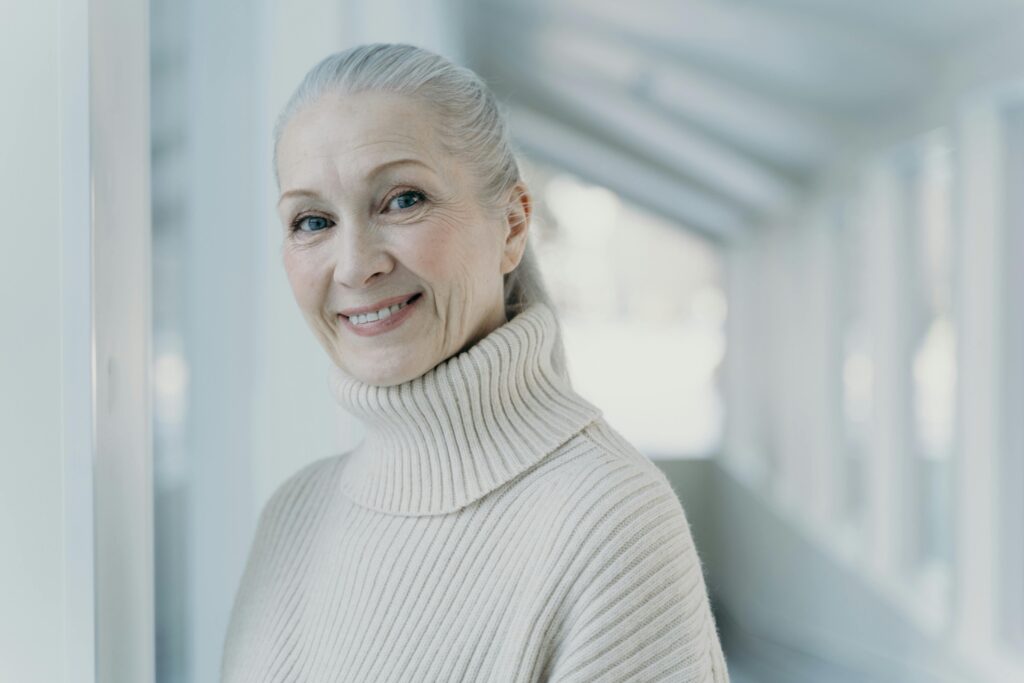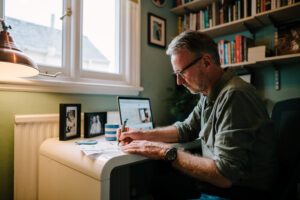Rather listen? Simply hit the play button and listen to the article in full
- Ready for retirement? 00:00
When Andrew Kent took early retirement, he found it such a shock that within two months he’d started a business.
Andrew had forged a 42-year career as an accident and emergency nurse in the NHS. He’d also had roles overseas as a pre-hospital flight nurse in the US, a nurse in the first Gulf War, and in refugee camps on the Iran/Iraq border and Afghanistan.
By the time he retired in 2018, he had moved into management and leadership in the NHS, and was in charge of about 3,500 people. “It was a massive shift to suddenly retire at the age of 55,” says Andrew.
“I went from very busy days as a senior NHS manager, where I was always talking to people, to being on my own at home. Work had been my life, and as the job involved long hours and shifts with colleagues, it had also been my social life. When it stopped, it came as a huge shock. I felt isolated and didn’t know what to do.”
Realising this new life wasn’t for him, within two months Andrew quit retirement to start his own business as a consultant. He did this happily for a few years before retiring recently – for the second time – at the age of 62. And this time, he’s found it suits him much better.
“I staggered it, so I was much better prepared,” he says. “My top advice to anyone retiring would be: start preparing well ahead. The thing I found the most difficult was how invisible you become when you retire. I struggled with how it affected my identity – suddenly, no one is interested in who you are.”
Sense of purpose
Andrew isn’t alone. In fact, 11% of people aged over 50 in the UK have returned to work after retiring, according to research by insurance firm Legal & General. Many report wanting to stay mentally active and needing a sense of purpose.
Lyndsey Simpson is founder and CEO of 55/Redefined, a champion for the over50s, advocating age diversity, positivity and inclusion across all areas of life.
“Retirement can be a fantastic experience if people are fully prepared for it,” she says. “Retirees can, however, experience the retirement rainbow. Rather than retirement being a neverending period of euphoria, it can have a 12- to 18-month lifespan. At the end of that period is a lack of purpose as people have a shrinking social group and experience isolation and invisibility.
“Our careers form a huge part of our lives – don’t ever underestimate that and make sure you have a plan in place for how you are going to spend your time.” Craig Jackson, professor of workplace health psychology at Birmingham City University and a chartered member of the British Psychological Society, agrees that preparation is crucial. “People need to think about how retirement will affect their identity and status,” says Craig. “For many of us, our job is our identity, and our job title is often how we introduce ourselves. It can be a psychological blow to lose that.
“That’s why people often describe themselves as being ‘a retired XXX’ – and there’s no harm in hanging onto this. “Retirement is something you should try – but it’s not for everyone. Lots of people decide to ‘unretire’ and bring their realworld experience and knowledge to other areas, such as academia or the media. “There’s a growing market for this – for example, giving talks or going on podcasts. It’s about keeping that identity alive in one shape or form.”
Craig adds that we should focus on using our time wisely and productively and not just being a babysitter when convenient or just ‘a pensioner’.
The value of hobbies
Research shows that keeping active and having hobbies, be it line-dancing or lunch clubs, can really help.
“The more hobbies and interests people have, the better their quality of life usually is,” Craig says. “In global studies, this tends to lead to longer life expectancy.
“There have also been studies to show that having an open attitude, being optimistic and living in harmony with nature are all linked to happiness. And happiness is associated with longevity.”
Frances Jackson, a retired primary school teacher from Manchester, says preparing for her retirement 16 years ago helped create the right mindset. “I knew I had to retire at 60 as teaching is exhausting and I couldn’t have gone on any longer,” she says.
“People thought I would be bad at retirement, so I decided to plan for it. I started putting together a booklet of ideas for things to do once I stopped working. I saved leaflets for activities that looked interesting, thinking about opportunities for learning, keeping fit, meeting people – and for pure pleasure! In the end, I didn’t ever look back at it – but I think that in putting it together I had got myself into the right headspace.
“I also knew that I had to find opportunities to earn a bit of extra money to top up my pension, so I did things like invigilating exams at schools for the first couple of years. I was even an extra in the TV show Shameless – I played a nun in a scene at Gorton Monastery!
“I made the decision that I didn’t want to just exist in a world of older people, so I sought out activities where I could be with people of different ages and from different backgrounds.
“Every week, I do dance, fitness and yoga, and I volunteer at a stay-and-play session for mothers and toddlers. I walk most places, sometimes ride my bike in the spring and summer, and I spend a lot of time gardening.
“Some of my happiest hours are at a local community arts centre in Old Trafford, called OT Creative Space. It is run by a lovely lady called Lynda. I’ve done everything from drawing to embroidery, – even making a diorama that was displayed in a wheelie bin gallery!
“Some of their sessions run weekly, others are one-off workshops run by practising artists. It’s such a friendly place, filled with people of all ages and different backgrounds. I am very lucky to have such a special place to spend some of the most joy-filled hours of my retirement.”
Positive mindset
Mindset is very important in retirement. Lyndsey points to studies showing that internalising negative age stereotypes can reduce our lifespan. She describes these as “those little put-downs you give yourself: ‘I can no longer get away with wearing that’, ‘I’m having a senior moment’, ‘I can’t take up running in my 50s’”.
Lyndsey says this highlights “the urgent need to dismantle harmful age-related biases and cultivate a society where every stage of life is valued and celebrated, ensuring we all have the opportunity to live our fullest, longest lives”.
Tina Boden is a coach specialising in work-life blend and making midlife matter. Based in North Yorkshire, she’s also the founder of the Making Midlife Matter collective, a cofounder of Accepting Who We Are (AWWA) and a later-life model.
Her advice for anyone retiring is to use this time as an opportunity to step out of your comfort zone. “I became a model in 2024 at the age of 56,” she says. “And I decided to enter a pageant and became Mrs North Yorkshire Galaxy 2024/25. As a naturally grey woman, with no Botox, fillers or other aesthetic additions, I am proud to promote that you are never too old, and it’s never too late to do something new.
“When you retire, it’s easy to slip into a routine where you don’t leave the house every day, or you stop trying new things. You have lots of spare time and might not be sure what to do with it all. At this point you’re at risk of losing your identity.
“The key is remembering you’re never too old to try something new. I recommend creating a fun, happiness and adventure bucket list – less about going on expensive cruises and more about looking at what you want to achieve.”
Tina says it’s also important to surround yourself with people who are going to build you up and help you to achieve your dreams. She recommends seeking out what brings you joy in life and going for it – because life is short.
For Andrew Kent, what brings him joy these days is his passion for yoga, which he used to help build up a network before retiring the second time round. He practises it several times a week and enjoys going on yoga retreats.
Andrew’s final piece of advice is: “Find your passion and pursue it. For me, that’s yoga. And seize the day, especially in your early retirement years when you’re more likely to have good health.
“If you want to travel, that’s great. But don’t forget that you will always need to come back home from travelling, and you need something – a purpose – that fills your time from Monday to Friday between trips. “And it needs to be something that isn’t just daytime TV.”






